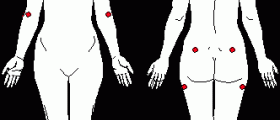
About pyridostigmine
Pyridostigmine is one of the medicines that are used in thetreatment of myasthenia gravis, a condition whose main symptom is weakness of muscles,but it can be used in several other purposes, such as in orthostatic hypotension,the condition in which the person’s blood pressure tends to drop suddenly andsignificantly after they stand up. Besides this, it is also used to relieve theeffects of the toxicity of curariform medicine, or the effect of certain musclerelaxants. What is unusual about this medicine is the fact that FDA has officiallyapproved its use in military situations in which people might be exposed to acertain nerve agent, because in such situations, pyridostigmine increaseschances of survival.
Possible side effectsand ways to avoid them
Just like with any other medicine, there are certain sideeffects that are possible with this one too. Some of them are practicallycommon for the majority of the medicines, regardless of the group to which they belong,and such side effects are vomiting, nauseas, and diarrhea. Headaches, problemswith blurred vision, sweating and problems with muscles such as twitches, mayalso be experienced, but none of these symptoms is considered to be tooserious, unless it persists for a longer period. Signs that call for medicalhelp and attention include severe cramps and weakness of muscles, cramps in thestomach, irregular heart rate (usually slow), and problems with urinating. Somepeople may also experience troubled speaking, fainting, as well as some othersigns that might not be mentioned here, and medical help is necessary in suchcases, as well.
Since pyridostigmine is known to cause contraindications inpeople who suffer from bronchial asthma, epilepsy, heart condition, or urinary,kidney or thyroid disorder, it should be used under the medical supervision insuch cases, or not used at all. Due to the possible interaction and seriousproblems that it might cause in these situations, it should not be suggested topeople who use certain other medications, such as anesthetics, musclesrelaxants, antibiotics, medicines for the treatment of heart arrhythmia, andeven magnesium. If it is necessary to use some of these combinations, the doctorshould be careful when prescribing the doses. The possibility of allergicreaction should not be excluded either, which is why the doctor has to makesure in advance that the patient does not have allergy to this medicine.

















Your thoughts on this
Loading...